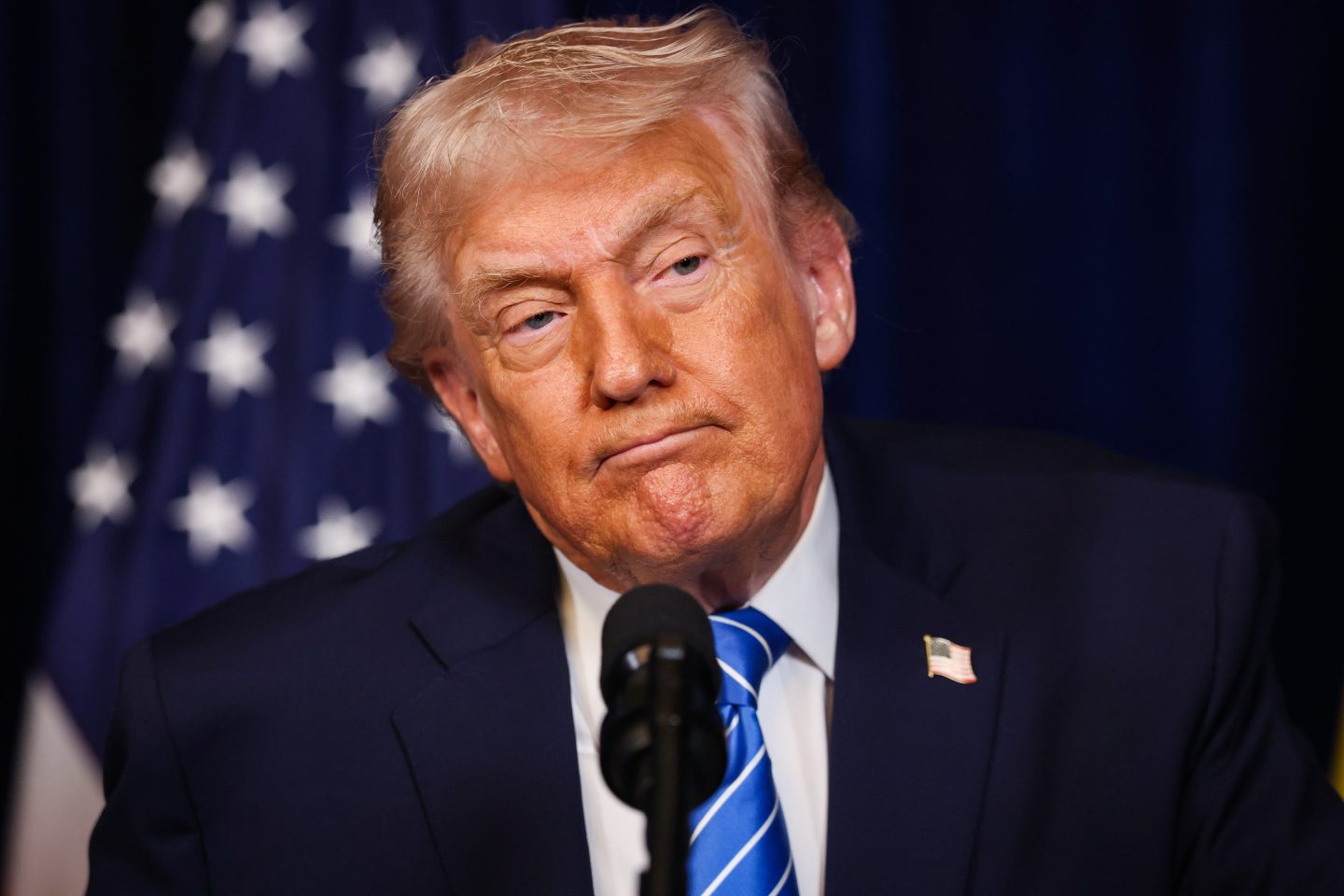This is the web version of the Bull Sheet, Fortune’s no-BS daily newsletter on the markets. Sign up to receive it in your inbox here.
Good morning.
The falling-yields-is-good-for-tech trend is alive and well this morning. Nasdaq futures are pulling ahead as the S&P 500 falters. Elsewhere, the safe-haven dollar is up while crude sinks as investors focus more attention on Europe’s bungled vaccine rollout.
In today’s essay, I have fresh data showing how the eurozone is beginning to decouple from its peers in North America and China—and not in a good way.
But first, let’s check in on the markets.
Markets update
Asia
- The major Asia indexes are mixed in afternoon trading, with the Shanghai Composite up 1.1%, but the Nikkei is sharply lower.
- Elon Musk declared over the weekend he’d never allow his cars to become rolling snooping devices. Turns out, China is so worried about such a prospect that it’s reportedly restricting Tesla use among military personnel and employees of state-owed enterprises. The whole matter is spooking some Tesla bulls.
- Saudi Aramco shares were flat at the open after the oil giant reported on Sunday a massive profits plunge. Still, Aramco didn’t touch its dividend, the world’s most generous.
Europe
- The European bourses were broadly lower out of the gates with the Stoxx Europe 600 down 0.6% as extended lockdown jitters continue to drag on investor sentiment. The problem: Europe’s “virus metrics are getting uglier.”
- Turkey goes through central bank chiefs like Italy used to churn through prime ministers… President Recep Tayyip Erdogan sacked yet another bank governor over the weekend, sending the Turkish Lira in a tailspin, down more than 10% at one point on Monday morning. Shares on the Borsa Istanbul—not Constantinople, mind you—bombed lower too.
- AstraZeneca shares were up 1.1% in early trade after the drugmaker disclosed on Monday morning promising U.S. trial results of its COVID-19 vaccine, paving the way for possible approval there.
U.S.
- U.S. futures have picked up where they left off on Friday—tech futures are higher, the DJIA and S&P, meanwhile, are going in the opposite direction. That’s after all three exchanges fell last week, with the Nasdaq off by 0.8%.
- The COVID picture in the U.S. is the mirror-opposite of what we’re seeing on the European continent. New cases, as measured by the seven-day average, are gradually, gradually ticking lower.
- Shares in Twitter and Facebook are flat this morning. Investors are apparently unperturbed by reports Donald Trump will launch a rival game-changer of a social media platform by the summer.
Elsewhere
- Gold is down, trading around $1,725/ounce. It’s barely budged in the last week.
- The dollar is up.
- Crude had a bad week, and Monday is no better. Brent is trading below $64/barrel.
- Bitcoin is flat, trading below $58,000.
***
Bullish on North America, China
I’ve been covering Deloitte’s quarterly CFO Signals survey over the past year as it reveals an important high-level view on how the C-suite views the road ahead.
The last time I checked in on the report, back in early December, we could see that finance chiefs were feeling noticeably more optimistic about 2021. That’s still largely true, with one big exception—the outlook on Europe.
Here on the continent, sentiment has actually slipped over the past quarter. Thirty-six percent of respondents this time round say they expect business conditions in Europe to be “better in a year”—that’s down a whisker from the 37% who were bullish on the year ahead the last time they were polled.

In comparison, business leaders in North America and China overwhelmingly feel the economies there are well and truly on the road to recovery.
In Europe, it’s not even close. As such, we’re starting to see a bit of a decoupling between the eurozone and North America. The reason? It comes down to the vaccine rollout.
Earlier this morning, Berenberg, the German investment bank, lowered its full-year eurozone GDP by 0.3%, blaming the effects of lockdown and restrictions that continue to dog the bloc’s biggest economies. On cue, European airline and retail stocks are taking it on the chin this morning.
Berenberg even wonders if it’s time to mention the, gasp, D-word when talking about the eurozone economy: downturn.

Deloitte sees worrying signs in its survey as well. “CFOs’ perceptions of Europe’s current economy are far less positive,” they report. “Only 7% consider it good, and 48% view it as bad and 1% as very bad.”
Watch to see if this downer sentiment begins to spill into the stock markets. So far in 2021, the Stoxx Europe 600 is outperforming the S&P 500 and Nasdaq as investors have been betting European stocks would deliver a bigger bang in the recovery trade.
Europe’s stuttering vaccine rollout could sink that bet.
Postscript
This is how we’re surviving the monotony of distance-learning, and battling the lockdown blues here in casa Warner.

Billiardino!
That’s what they call it here in Italy. (Actually, this one is a mini billiardino table, but it still gets the adrenaline flowing.)
The noise coming from our apartment at odd hours of the day must be bugging my neighbors to no end. The Italo-Jersey trash-talking, the racket from bank shots and the whoops of goooooal! can be heard halfway to the Tiber (when we have the windows open, at least).
The girls have a proper billiardino table at school where they duel their classmates in daily tournaments. As such, they’ve brought these alien terms and rules into the house when we play. They insist, for example, on the cockamamie rule that if the goaltender scores it’s worth two points. And they prefer the dreaded scorpione pass-in shot after a goal.
In the first few days of lockdown, the games were fairly one-sided. I swept them every time. But, after a week, the little grasshoppers have turned the tables on me.
In fact, I’d better wrap this Postscript up subito. They’ve been trash-talking all morning.
***
Bernhard Warner
@BernhardWarner
Bernhard.Warner@Fortune.com
As always, you can write to bullsheet@fortune.com or reply to this email with suggestions and feedback.
Today's reads
What the influencers say. Stock influencers are nothing new. But there's nothing quite like the sway that VC Chamath Palihapitiya, Barstool Sports founder David Portnoy, Elon Musk and fund manager Cathie Wood hold on today's investors. The Wall Street Journal's Akane Otani writes a fascinating piece about the new generation of stock influencers, and which ones are likely to stand the test of time.
Lumbering along. A few weeks ago, I shared here the story of the impact rising lumber prices were having on the housing market. The situation has only gotten worse, my colleague Lance Lambert reports, with lumber prices hitting an all-time-high—enough to add $24,000 to the price tag of a new single-family home.
Of interest. You've already seen the impact of rising bond yields on stocks. Should the run continue, you'll be feeling the fallout in the red-hot housing market as well.
Some of these stories require a subscription to access. There is a discount offer for our loyal readers if you use this link to sign up. Thank you for supporting our journalism.
Market candy
Thought of the day
Has the stock market ever crashed as the economy soared?
That riddle comes courtesy of Ben Carlson of Ritholtz Wealth Management, a frequent Fortune contributor. Carlson asks this question amid one of the more puzzling market slumps on record—the economy is set for blast-off, but stocks are on the retreat. Has such a thing ever happened before? Carlson, it turns out, has the answer. It's a fascinating history lesson that offers some important take-aways for what we're seeing in today's markets.











